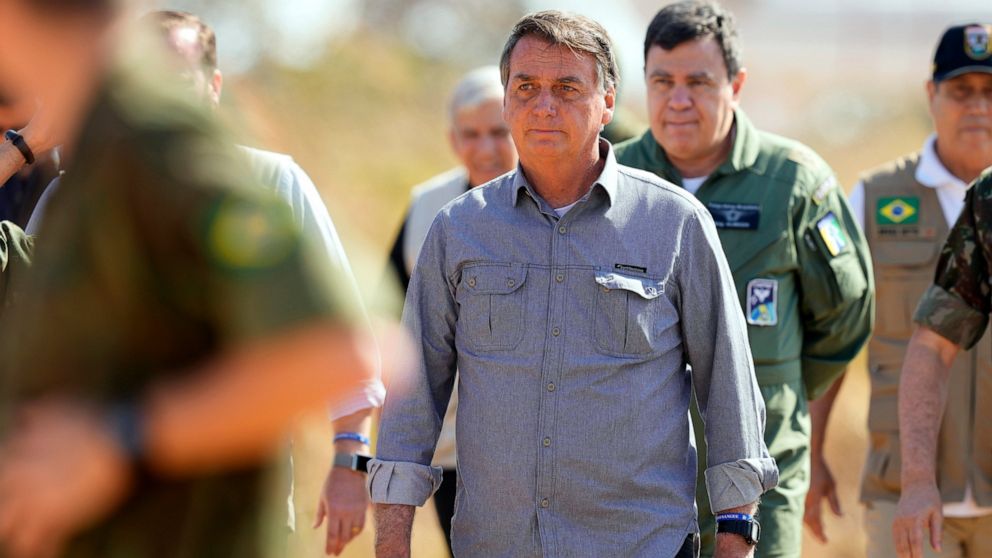Sources: Brazil’s Bolsonaro vexed by central bank autonomy
Brazilian government officials have told The Associated Press that President Jair Bolsonaro has begun expressing irritation at the central bank’s newfound autonomy as surging inflation presents a threat to his 2022 reelection prospects
BRASILIA, Brazil — Brazil’s President Jair Bolsonaro has begun expressing irritation at the central bank’s newfound autonomy as surging inflation presents a threat to his 2022 reelection prospects, government officials told The Associated Press.
On Thursday, during a flight home from Mato Grosso state, Bolsonaro said he regretted signing the bill into law earlier this year that granted the bank autonomy, a high-level official aboard told the AP. Separately, Bolsonaro on several recent occasions has expressed discomfort with the autonomy and said that he would like to interfere in monetary policy, a minister who has heard such complaints himself told the AP. Both spoke on condition of anonymity because they weren’t authorized to speak publicly.
The law passed in February sought to protect the bank from political meddling and burnish Brazil’s economic credibility among investors. Under the law’s terms, the president still nominates the central bank chief, but cannot fire him for disagreements about monetary policy.
Bolsonaro in 2018 provided assurances that he would remain hands-off economic policymaking, and the market celebrated his pick to lead the central bank: economist and former trader Roberto Campos Neto, who began a fixed four-year term in April.
Bank autonomy is among few significant economic reforms that Bolsonaro’s administration has managed to secure. Others have faced headwinds, including lately a tax reform proposal, at the same time as the government signals it may boost spending next year despite limited fiscal space.
That has prompted a sell-off due to concerns about Brazil’s fiscal policy outlook, as well as speculation the market could give up hope on the Bolsonaro administration’s will or ability to deliver further reforms — particularly as the president keeps focusing energy on his simmering feud with the Supreme Court.
Twelve-month inflation is tracking at almost 9%, its fastest pace in over five years. After the government drew down pandemic welfare disbursements, the poor have been especially hard hit by double-digit increases in the prices of foodstuffs, cooking gas and electricity.
Economists surveyed by the monetary authority have raised their median 2021 inflation forecast for 19 straight weeks, to 7.05%. That would mean the cost of living will exceed the central bank’s target for the first time in six years. The bank in 2021 is targeting 3.75%, plus or minus 1.5 percentage points.
Economists expect 3.9% inflation in 2022, nearly the midpoint of the bank’s target range after creeping upward in recent weeks. Still, the minister who spoke on condition of anonymity told the AP that Bolsonaro has spoken of his concern about out-of-control inflation during the election year. There have been reports that the ongoing drought – Brazil’s worst in 9 decades – could present sharp inflation pressure associated with costlier thermoelectric generation rather than hydroelectric plants.
Neither the office of the presidency nor the central bank immediately responded to requests from the AP for comment about Bolsonaro’s statements regarding central bank autonomy.
Bolsonaro’s statement about regretting central bank autonomy came in response to comments hours earlier from Campos Neto, who the president said he wished he could replace with the stroke of a pen, according to the official present. Campos Neto said in an online event hosted by the Council of the Americas that “local noise” has had an impact on 2022 inflation expectations.
“There is uncertainty, or at least a higher level of noise, in the institutional part of how Brazil works and the fight between powers,″ Campos Neto said, adding that the market has also understood the government is seeking to increase spending of its conditional-cash transfer program for the poor.
“In other words, the market is associating some of the actions the government is taking to a will to have a more robust program, and they’re linking some of the things the government is doing with the election, and I think that creates additional noise,” he said.
The central bank’s benchmark Selic rate remained at a record-low 2% until earlier this year. The monetary authority has since been hiking the Selic, most recently this month to 5.25%. Economists forecast it will reach 7.5% by year end – its highest since 2017. ——— Biller reported from Rio de Janeiro.
![]()


